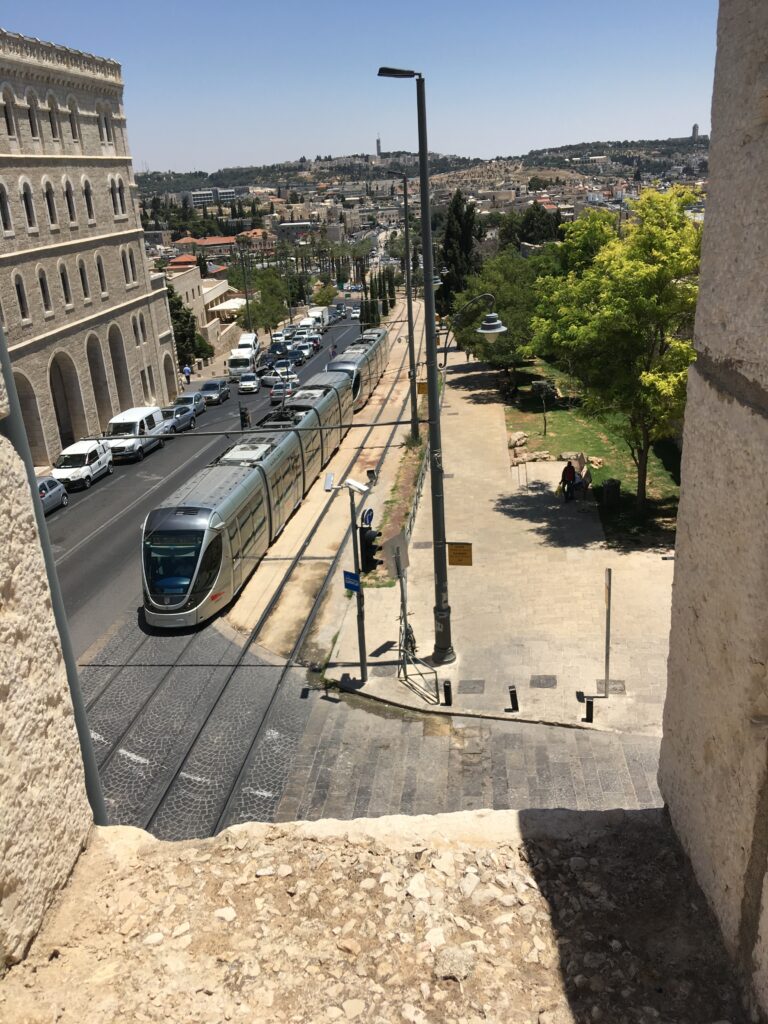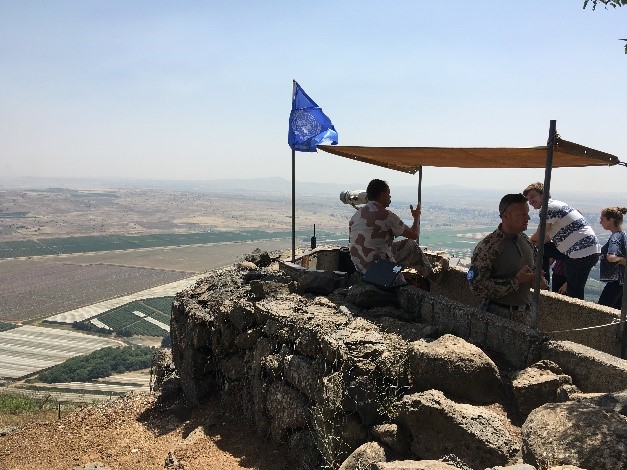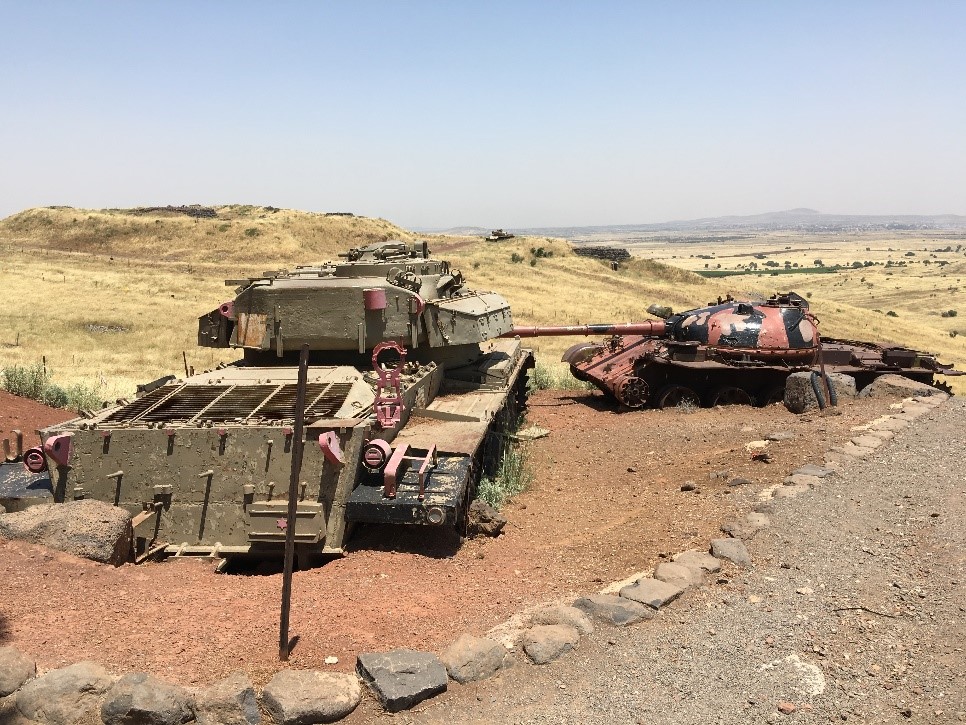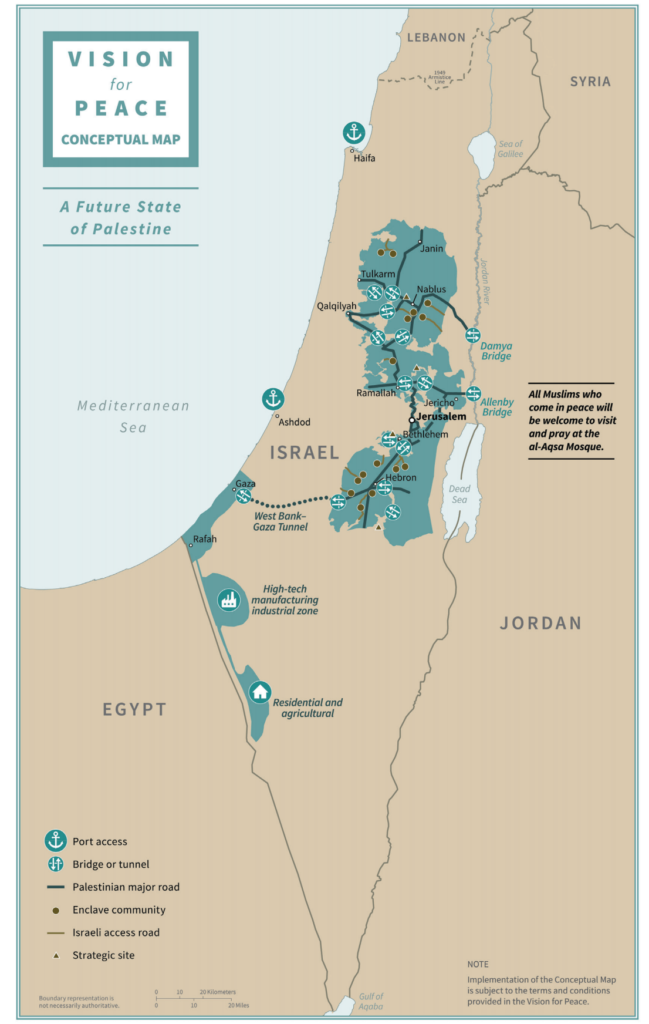When will it end? When will there be peace? We ask these questions about the Middle East, and have done for years. But bloody conflict after conflict grinds on, and not just to do with Israel/Palestine. Syria, Lebanon, Yemen and others…..
As ever, the great and the good tell us that a ‘2 state solution’ is the answer. A secure Israel and an independent Palestinian state. But is it? And even if it were possible, what would it look like?
Israel is a prosperous democracy, which has faced repeated attempts to destroy it. The Palestinian territories have not held any elections for 15 years, and such rulers as they have are committed to Israel’s destruction. Whilst we should feel sympathy with ordinary Palestinians, any future state would need to be: A) viable and B) able to live alongside Israel in peace. In principle, a solution should be found.
However: as we’ll see in my article, it is my basic contention that a Palestinian state would be- at best- an unstable failed state and- at worst- a direct terrorist threat to Israel’s very existence.
Israel is a modern, prosperous and democratic country. It is a reliable Western ally in an unstable region. It has a free media, an independent Judiciary, equality for women and tolerance of homosexuality. It’s the only country in the Middle East where Jews, Muslims, Druze and Christians live in sizeable numbers, and all have freedom of worship.
Jews and Arabs have equal citizenship, and people are often surprised to hear that the population is 20% Arab. (Sadly, recent events have seen trouble between the 2 communities- something rare). An Arab party is in the new governing Coalition.
On the other hand it is certainly not perfect, and should not be above questioning and criticism. I agree that doing so is not anti-Semitic as such, but when Israel is singled out for criticism, time-after-time you do have to ask what other factors are at play. And whilst I am pro-Israeli and 100% support their right to exist, and defend themselves, they have at times used excessive force in doing so.
The political situation in the geographically separate West Bank (or Judea and Samaria, as some call it) ruled by Fatah, and in that in Gaza, ruled by Hamas, are somewhat different. The 2 groups fought a bitter civil war in which hundreds were killed and relations are still strained. Palestinian President Abbas (of Fatah) was elected on 2005 for a 4 year term, but there have been no elections since and he rules by emergency powers. In fact, it is said that he is now in the 17th year of his 4 year term! No other Palestinian elections have been held since 2006, and the Legislative Council (which had a Hamas majority) has not met since 2007. Elections planned this year have again been put off.
Amnesty International writes that the Palestinian Authorities “continue to crack down on dissent, including by stifling freedoms of expression and assembly, attacking journalists and detaining opponents” https://www.amnesty.org/en/countries/middle-east-and-north-africa/palestine-state-of/
It would however be harsh not to have sympathy for ordinary Palestinians, caught between their own armed militants, corrupt and unaccountable leadership and Israeli security. Solutions are needed for their sakes too.
The status of Jerusalem is an ever-present issue. It is sacred to Muslims, Jews and Christians. The original 1947 UN plan for British-mandated Palestine (creating a separate mostly Jewish state and a mostly Arab state) foresaw it as a shared or international city under UN administration. On a historical note, Britain was given the governing Mandate by the League of Nations, after WW1. Prior to that it was part of the Turkish Ottoman empire- British & Commonwealth forces under General Allenby (don’t forget Lawrence of Arabia too!) drove the Turks out in 1917. This was a significant historical year, as the Balfour Declaration was issued by the British goverment "viewing with favour" the esthablishment of a Jewish national home.

Jerusalem has been the Jewish capital for over 3000 years, has a majority Jewish population and has never been anyone else’s capital. It’s mentioned 800 times in the Bible and has only been divided once- under Jordanian occupation for 19 years from 1948 to the 6 day war in 1967 (during which time Jews were expelled and the Jewish quarter largely demolished). We are now told that the most sacred sites in Judaism (including the western or wailing wall) are “illegally occupied” by Israel!

It is beyond dispute that it’s Israel’s capital- their Parliament (Knesset), Supreme Court, Presidential and Prime Ministerial residences, Central Bank and many Ministries are there. President Trump was quite right to move the US Embassy from Tel Aviv to Jerusalem. Congress had voted for it in 1995, but successive Presidents had kicked the can down the road. It is widely believed that the Biden administration will not reverse this- nor the US recognition of Israel’s annexation of the Golan Heights.

Today the UK Embassy is still in Tel Aviv- with British officials reportedly having to sometimes travel to Jerusalem to meet with Israeli officials! There’s a small Consulate in ‘East’ Jerusalem to the Palestinian territories. The official position is that we await a wider settlement, another excuse for inaction and delay.
Much is also made of the West Bank security barrier erected by Israel. You mostly only ever see photos of the admittedly ugly walled part, though over 90% is fenced. The barrier, erected at huge expense, was not put up for fun. Suicide bombings into Israel at one stage were running at more than one a week. Innocent civilians, families and children were deliberately targeted. Cafes, buses and shopping malls were all hit. The worst attack killed 30 at a Passover meal. Thanks largely to the barrier, there have been no suicide bombing deaths in Israel since 2008.
There are 22 countries in the Arab League, but only 1 Jewish homeland. Israel is not a large country and is about the same size as Wales. In fact, Israel is only about the 160th largest country in terms of territory. One of the complaints of the Palestinian lobby, is that Israel has not ‘left’ the Palestinian territories with enough land to be a viable state. Whilst they are smaller than Israel, and Gaza is certainly heavily populated, they have more land than Brunei, Hong Kong, Luxembourg, Malta, Gibraltar, Singapore and Bahrain. These are all prosperous territories, and are not in receipt of the substantial foreign aid that the Palestinian territories have enjoyed over the years.
The Palestinian refugee issue (mostly from the conflicts of ’48 and ’67) is not unreasonably highlighted, but the Jewish expulsions from Arab countries of the same era do not seem to merit the same levels of publicity. It seems extraordinary now, but historically there was a widespread Jewish diaspora of about 800,000 stretching from Morocco to Iran. Most of them have become well-settled in Israel after expulsion, which ironically has helped to strengthen the country.
To be forced to flee from ones’ home is a truly terrible thing. But the question must be asked: for how many successive generations can people reasonably be called refugees with a ‘right of return’? This is not just a rhetorical question; it is one of the issues making any solution much more difficult. The Palestinian leadership continue to demand this right, which would leave Israel having to potentially accommodate an influx of several million Palestinians. Not surprisingly, this totally unrealistic demand is rejected.
Former Israeli PM Moshe Sharett argued that what took place was effectively an exchange of populations. That bald phrase covers a multitude of miseries on all sides. But there is ample historical precedence for it, albeit often under terrible conditions, eg: Greece/Turkey in the early 1920s and India/Pakistan in the late 1940s. I therefore conclude that Palestinian ‘right of return’ demands are totally unreasonable, and are sadly yet another insurmountable obstacle to a solution. In theory, many Israeli descendants of those expelled from Arab countries could demand the same.
During my time in the Army, much thought and training went into the reasonable use of force and right of defence. Colonel Richard Kemp has spoken in defence of Israel’s record there. Their record is largely good, and occasional lapses are seized upon by hostile activists and media. However, my take is that Israel has sometimes used excessive force. ‘Rise and Kill First’- a book on Israel’s targeted assassination programme was a fascinating read. As daring as many of the killings were, with targets deserving little if any sympathy, I was left with the impression that some were carried out simply because they could be and were of dubious legality.
When in Israel in 2018, our guide was a former tank driver who admitted to me they had fired anti-personnel ammunition from their main armament on the streets of Gaza. Artillery, usually an area weapon, was used during the recent conflict there. Guided munitions would be more acceptable. It has been said that Hamas use their people to shield their rockets, but Israel use their rockets to shield their people. Israel’s right to defend herself must be accepted, including incursions into the Palestinian territories where needed. However, I was glad to see that they did not launch a ground offensive in the recent Gaza conflict.
Israeli settlements in the West Bank are another issue. All settlers were pulled out of Gaza (some forcibly) by Israel in 2005. Rockets were fired into Israel soon after. Subsequently, Hamas was elected in 2006 (no elections since!) and now control Gaza.
Sadly, the pull-out from Gaza is now regretted by many in Israel. There were fond hopes that it would trigger some movement from the Palestinian side. The response has been more rockets and tunnel incursions into Israel. At its central waist the country is only about 10 miles wide. It’s militarily indefensible. The Judean hills overlook much of Israel’s coastal plain, including Ben Gurion airport and Tel Aviv. Any withdrawal from the West Bank (where there are far more Israelis- some of them quite militant) would now be difficult, if not impossible.
In the past, ‘land for peace’ has worked for Israel and they have long-standing peace treaties with previous adversaries Jordan and Egypt. More recently the Abraham Accord agreements were signed with Bahrain, UAE, Morocco and Sudan. These deals have given the lie to the Obama administrations emphasis that negotiations with Palestine first should be the priority for Israel. The Palestinian leadership will not listen- let alone negotiate- with Israel. However, might they listen to- and respond to pressure from- other Arab countries?

Relations with the Saudis are said to be friendly, especially as both have major concerns over the possibility of a nuclear-armed Iran. The deal that the West naively gave them- including the USA flying in literally planeloads of cash- has strengthened Iran’s hand. There has never been any doubt in my mind that they want nuclear weapons, something Israel cannot be expected to tolerate. They are of course also major supporters of terrorist groups like Hamas and Hezbollah.
Despite justifiable human rights concerns, it is in the Wests' interests to have good relations with the Sunni Arab nation such as Egypt, Jordan and the Saudis.
The Trump administrations modestly entitled ‘Deal of the Century’ was interesting, but predictably did not make much headway. See map below. The most imaginative proposal was a 20 mile long tunnel under Israel linking Gaza with the West Bank. I’m tempted to say that enough troubles have already been caused by Hamas controlled tunnels!

Hezbollah are also tunnelling into northern Israel from Lebanon. Some of these ‘terror tunnels’ are very well-equipped, sporting airflow & phone equipment and large enough to drive vehicles through. When in northern Israel by the Lebanese border we were able to see villages flying the yellow Hezbollah flag (through binoculars).

In the UK, we are used to what we hear about Israel being filtering through a media with a mixed record on the topic, especially the BBC. The Balen Report was commissioned internally in 2004 to examine allegations of anti-Israeli bias at the BBC. It is rumoured to confirm anti-Israeli bias, and had a very restricted internal circulation. To this day, it has never been made public- despite several Freedom of Information and legal attempts to do so. The BBC have reportedly spent £330,000 of licence-payers money on preventing its release. As they say: “viewer discretion is advised”!
I can only recommend visiting Israel for a clear and honest view.
It remains difficult to see the way forward. The main sticking points remain:
- Palestinian demands for ‘right of return’
- Continued Israeli settlement on the West Bank
- Recognition of Israel’s right to a peaceful existence
- Mutual suspicion & hostility
- The status of Jerusalem
In summary, we must never lose sight of Israel, democratic and prosperous, as a key Western ally in an unstable region. Their first concern can only be their own security and existence, especially after repeated attempts over the years to destroy them.
Many ordinary Palestinians are clearly in an unenviable situation, but sadly it is difficult to see a positive way forward for them. Their corrupt and dictatorial leadership refuses to deal with, or even recognise, Israel in a way that could make a wider settlement possible.
For all of the above reasons I therefore regrettably conclude that the current situation is likely to continue.
 Email Tim
Email Tim


